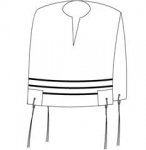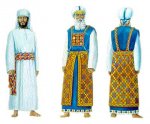Most of you have an idea about my position on a few of these issues already...But here's what I can't shake when thinking about Hebrew Roots and such. We know Christ said...
Matthew 7:13
And right after this, Christ goes on to talk about...
- The
True vs. False Prophets (Matthew 7:15-20)
- The
True vs. False Disciples (Matthew 7:20-23)
- The
Wise vs. Foolish Builder Parable (Matthew 7:24-28)
...and right before Matthew 7:13 Christ is speaking about "asking, seeking & knocking" for the door (of I'm assuming the gift of knowledge about the truth) to be opened to us.
From the context given, Christ isn't talking about the unbelieving world who's on the broad road to destruction. While that would be true, those people are not the subject of his message. So this tells me that the *majority* of we professed believers have not found that small gate and narrow road...
mathematically; logically. In other words,
Christianity 'en totale' is (in its broadest understanding) we who haven't got it exactly right and who walk the broad road, while there's
a "very small" percentage of Christians who do.
For instance, Christ had thousands of disciples, but only a few (12) continued to follow him...
Then out of the 12 who followed him, only fewer still (3) saw him in his kingdom ("transfiguration").
Now I'm not directly arguing for the Hebrew Roots *Movement* (because I don't exactly know what it entails) so much as I'm arguing for understanding the Hebrew Roots of the faith we all profess...notwithstanding,
isn't it true that the "majority" of believers is the group that misses out (at least as far as Christ says)?
----
Here's an example of how understanding the *Hebrew Roots [NOT *Jewish Roots] opens understanding about Christ:
Matthew 9:20-22
She didn't just come to him because he was recognized as someone who had the power of healing, but came to him - not saying a word - and acted on her faith based on *something* she previously knew as truth ahead of him...and of course Christ confirmed the truth she knew.
Matthew 14:36
There were many who simply touched Christ's clothes and were healed, including the famed woman...but they didn't just touch his clothes anywhere. Now some of today's believers may think nothing of this scene and say "well he was the Son of God so of course he had the power to heal", no giving a second thought as to what actually happened and what it means...they don't get any deeper understanding. They don't get any closer.
[Like Israel, truly they see The Majesty; they see the power of the mountain burning & quaking with fire, but they dare not climb higher or listen more intently.]
Whereas for those who study and practice those things God said NEVER to forget "throughout your generationS", they know there was much more to that scene than people simple touching Christ's clothes; that what he was wearing speaks volumes.
Numbers 15:38
View attachment 61164
View attachment 61165
Why blue? Well when Moses, Aaron & the 70 elders ascended higher up the mountain (that the "majority" wasn't allowed to touch) this is what they saw...
Exodus 24:10
The stone of heaven was
blue...the very stone God's Throne was made out of...
Ezekiel 1:26
...The very stone on which God carved the FIRST copy of the tablets...
Exodus 24:12
...But the
FIRST copy (from heaven) was broken (by Moses) because of the sin of God's people (that
same "majority" at the base of the mountain who was barred from toughing it)...so then God commanded that Moses, a man, *
himself had to write the
SECOND copy* while God dictated to him *exactly* what was written on the first copy...only this time it was carved on
stone Moses gets from the earth [btw, I think there's a GIGANTIC prophetic message right here].
Then Malachi prophesies...
Malachi 4:2
The people in the time of Christ *knew* the Hebrew scriptures & culture; they saw these connections. They knew that if Christ was the Messiah he would confirm the truth they already had from the scriptures...and because of what those tassels represent, even his clothes spoke the same confirmation.
This was revealed to me by studying the Hebrew [not Jewish] Roots of the faith




